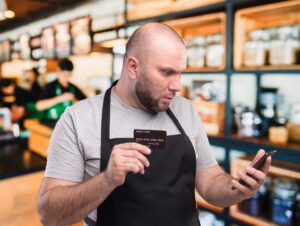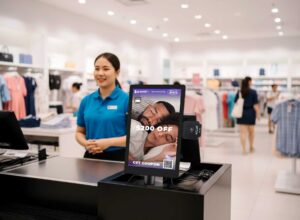
Mobile points of sale offer consumers and businesses alike the ability to complete transactions in non-traditional locations – offline and away from the main register. PowerRetail suggested multiple ideas businesses should examine when preparing for mPOS, highlighting that mPOS systems offer portable and cost-effective solutions for business owners compared to traditional points of sale. PowerRetail expressed that mPOS integration needs to be simplified yet thorough, explaining that businesses should investigate how to use mPOS systems effectively before relying on them to prevent complications from arising in the future.
Getting Started
Despite the growing market of mPOS solutions and the ever-present consumer demand for convenience, many businesses are wary about adopting mPOS capabilities. In recent research compiled by Business Insider, the news outlet discovered that only 40 percent of small and medium-sized companies have active mPOS systems. Having analyzed this data, BI theorized that business owners were timid about making a transition to mPOS, with many companies finding such processes difficult to adapt to, favoring traditional points of sale out of frustration. These issues can be the result of software that is inadequate or contains bugs or from analysts that are uneducated with how to use these data tools to their full potential.
PowerRetail noted that companies should plan with their mPOS providers when implementing these solutions, but that hands-on experience for employees will expedite the learning process. Understanding as much as possible about the functionality and use of the systems can help prevent failed use of this transaction style in the field. As the sales industry moves forward, CEO and Founder of Bill.com Rene Lacerte wrote for PaymentsSource that mobile points of sale will continue to be integral to business as the technology further integrates with current market payment solutions and banking systems to provide effective convenience for consumers. Traditional payment solutions are complicated and left vulnerable to human error, Lacerte added.
Unconventional Storefronts
Mobile devices backed by mPOS technology have given companies unique opportunities to bring transaction payment systems to the consumer. One example comes from the restaurant industry, where research conducted by tech comparison site, Software Advice, showed that self-service POS systems are growing in popularity. These often tablet-based applications allow customers to order and pay from their table without having to involve waitstaff. According to its findings, Software Advice discovered several patterns where consumers enjoyed features that mPOS offered, including order customization, bill splitting and simply saving time waiting for the check. The data showed that younger to middle-aged guests who were more comfortable with mobile tech favored the mPOS capabilities over traditional waiting, although the older crowd still preferred to be waited on.
“Mobile devices backed by mPOS technology have given companies unique opportunities.”
Other businesses are making the effort to involve mPOS technology by bringing the register to the consumer where they live. Included among these companies is WeGoShop.com, a grocery delivery service catering to the United States, Canada, the United Kingdom and the Bahamas. According to its website, WeGoShop has been operating since 1999 and allows consumers to pay at their door with cash, checks or through portable card readers that accept customer credit and debit. Payment on delivery may not be available in every location, however, as WeGoShop facilities are independently owned and operated by affiliates that may chose to set restrictions on transaction styles and accepted forms of payment.
With the development of more capable mobile devices each year and the increasing popularity and demand for mPOS systems, company owners would be wise to investigate how they can apply this service style to their own businesses. Lacerte emphasized that the growth of digital transaction processing has embodied companies big and small with faster and easier methods to accept payments from consumers.



